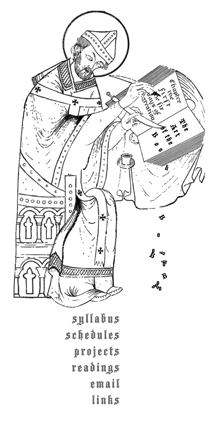
The purpose of this page is to provide an overview of the various aspects of the program.
Lecture: Lectures are your faculty's opportunity to present ideas and information to frame and extend other program activities. We each have our own approach to the themes and disciplines of the program that will also allow us to model a rich process of inquiry and argument. Of course, some amount of lecture time will be given up to "program business," guest speakers, or maybe possibly a film.
Workshop: Workshops are a staple of evergreen program work. They are meant to be a middle ground between faculty-led inquiry and open-ended student centered inquiry; to put it more simply: faculty offer challenges that students collaborate to work through, presumably learning something in particular. Some of workshops will be of a more technical nature, preparing you for studio work and projects.
Pre-seminar Workshop: Built into our Monday workshop time will be a pre-seminar, a discussion of the week's readings designed to prepare us for Wednesday seminar. You needn't have finished the reading for the preseminar, but you should have thoroughly begun—the point is that we can deal with questions and issues that usually drag on the regular seminar.
Readings/Seminar: Wednesday seminar will be focused entirely upon the texts for that week and connections to previous texts and program themes. We'll begin each seminar as a large group and make divisions as appropriate for small group discussions. Though you'll be assigned a "seminar faculty," you'll have the opportunity to work with both of us and with most of the other students in the program. You may be required to do specific work in preparation for seminar, including writing, research, or facilitation prep.
Creative Writing Workshops: Almost immediately after Wednesday Seminar, we'll all go to the Writing Center to meet with our glorious Program Writing Tutors, who will lead us through a dynamic series of Creative Writing Workshops. Students interested interested in credit and substantial evaluation of creative writing will have the opportunity to participate in advanced workshops.
Studio Workshops: We'll be in the studio on Tuesdays and Thursdays, usually in the basement of the Lab II building —print studio, 0219, or 0216. These are not open studio times or optional or casual meetings. You must attend and you must be there on time. Studio Workshops will allow you to begin developing proficieny in a range of art making processes related to book arts. The basic workshops are introductory. You will also choose some processes to continue and do more "advanced" work.
Advanced Workshops: Each student will choose XXX advanced workshops in order to focus in on certain processes and build on basic skills. Where the basic workshops require only the completion of a proficiency, advanced workshops entail the assumption of at least one additional project. It is expected that that your choice of advanced workshops will directly support your final independent project.
Projects: "Projects" will be our word for all assignments other than essays, workshops and busy work. Projects include your independent final project, a few long term projects, proficiencies, and advanced workshop pieces
Essays: The essays are a major component of your quarter's work and are the primary indicator of your engagemnet with and mastery of program texts and themes. Though much of the credit earned available would seem to be a reflection of studio work, that work is not considered complete without substantial academic foundations.
Program Covenant: The prorgam covenant will establish the commitment we enter into above and beyond the requirements for credit, including a collaborative spirit, the ethos of our intellectual work, and the ceative and critical atmosphere we seek to create.